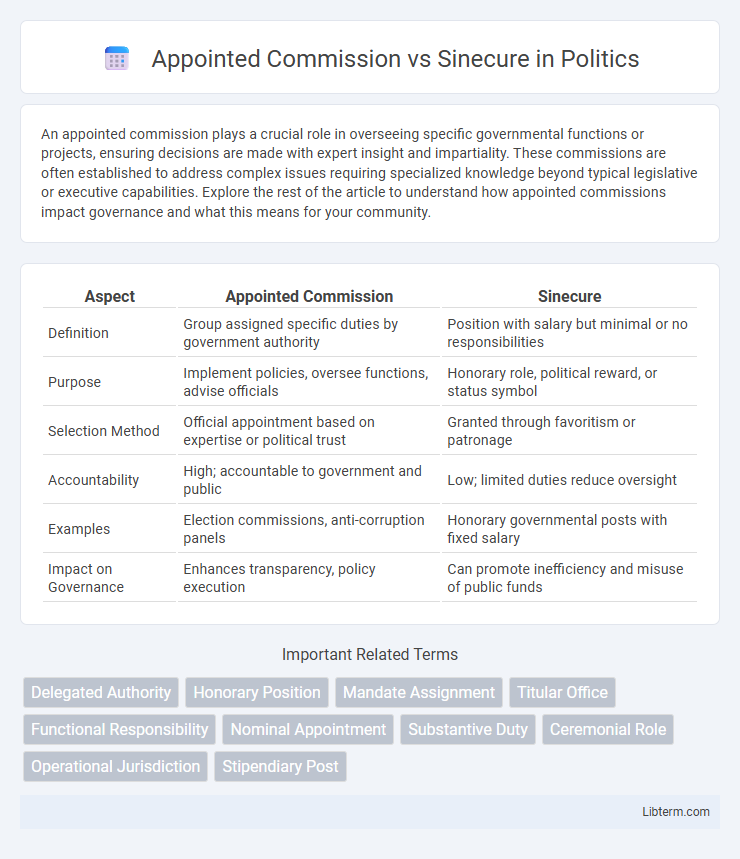An appointed commission plays a crucial role in overseeing specific governmental functions or projects, ensuring decisions are made with expert insight and impartiality. These commissions are often established to address complex issues requiring specialized knowledge beyond typical legislative or executive capabilities. Explore the rest of the article to understand how appointed commissions impact governance and what this means for your community.
Table of Comparison
| Aspect | Appointed Commission | Sinecure |
|---|---|---|
| Definition | Group assigned specific duties by government authority | Position with salary but minimal or no responsibilities |
| Purpose | Implement policies, oversee functions, advise officials | Honorary role, political reward, or status symbol |
| Selection Method | Official appointment based on expertise or political trust | Granted through favoritism or patronage |
| Accountability | High; accountable to government and public | Low; limited duties reduce oversight |
| Examples | Election commissions, anti-corruption panels | Honorary governmental posts with fixed salary |
| Impact on Governance | Enhances transparency, policy execution | Can promote inefficiency and misuse of public funds |
Definition of Appointed Commission
An appointed commission refers to a formal group or body established by a government or organization, with members selected or designated to perform specific duties or functions. These commissions are created to address regulatory, advisory, or investigative tasks, often playing a crucial role in policymaking and oversight. Unlike sinecures, which are positions requiring little to no active responsibilities, appointed commissions demand active participation and decision-making from their members.
Understanding Sinecure Positions
Sinecure positions refer to roles that require little or no actual work while providing financial benefits or status, often appointed through commissions to individuals based on favor rather than merit. These appointments can create inefficiencies by occupying organizational resources without fulfilling essential duties, contrasting with genuinely appointed commissions tasked with specific responsibilities. Understanding sinecure positions involves recognizing their historical use as political rewards and their impact on institutional accountability and performance.
Historical Origins of Appointed Commissions
Appointed commissions originated historically as authoritative bodies established by monarchs or governments to manage specific functions or inquiries, often serving temporary purposes during times of political or administrative need. These commissions were designed to exercise delegated powers and ensured direct control by sovereign or state officials, contrasting with sinecures, which were typically granted as honorary offices offering income without corresponding responsibilities. Over time, appointed commissions evolved within bureaucratic systems to provide specialized oversight and expertise, maintaining distinct roles from sinecure positions entrenched in patronage and ceremonial status.
Evolution and Context of Sinecures
Sinecures historically originated as appointed commissions granting officeholders salary and status without significant duties, evolving from medieval ecclesiastical and governmental roles designed to reward loyalty or service. Over time, societal reforms and administrative efficiency demands prompted the reduction of sinecure positions, emphasizing merit-based appointments and functional responsibilities. The shift reflects broader political and economic transformations, diminishing the prevalence of sinecures compared to contemporary appointed commissions with clearly defined duties.
Key Differences: Appointed Commission vs Sinecure
An appointed commission is a formal body or individual assigned specific tasks or responsibilities by a government or organization, often involving active decision-making and oversight. In contrast, a sinecure is a position that offers financial benefit or status but requires little to no actual work or duties. The key difference lies in the level of responsibility and workload, with appointed commissions being functional and task-oriented, while sinecures are primarily honorary or nominal roles.
Roles, Responsibilities, and Accountability
Appointed commissions hold defined roles with specific responsibilities and clear accountability mechanisms within organizational or governmental structures. They are tasked with decision-making, policy formulation, or oversight functions and must regularly report their actions and outcomes to supervising authorities. In contrast, sinecure positions typically involve nominal duties with minimal responsibilities or accountability, often serving ceremonial or symbolic purposes rather than active governance or management roles.
Impact on Public Administration and Governance
Appointed commissions enhance public administration by providing specialized expertise and facilitating accountability, thereby improving policy implementation and governance quality. Sinecure positions, often characterized by nominal duties with inadequate oversight, can undermine administrative efficiency and foster corruption, weakening institutional trust. Effective governance relies on balancing commission appointments to promote merit-based contributions while minimizing sinecure-induced inefficiencies.
Common Examples in Modern Institutions
Appointed commissions often include members selected for their expertise or stakeholder representation, such as regulatory bodies like the Federal Communications Commission (FCC) or the Securities and Exchange Commission (SEC). Sinecure positions, by contrast, are roles with minimal responsibilities but with salary or benefits, historically common in some bureaucracies or ceremonial government roles like honorary titles or sinecure clerical posts. Modern institutions distinguish commissions as functional, operational bodies, whereas sinecures are criticized for lacking substantive tasks despite providing financial or status benefits.
Controversies and Criticisms
Appointed commissions face controversy over perceived biases and lack of transparency, often criticized for political patronage and inefficiency in fulfilling mandates. Sinecures spark debates on government waste and ethical concerns, as they provide remuneration without corresponding duties, undermining public trust and accountability. Both constructs are scrutinized for eroding institutional integrity and fueling public skepticism in administrative processes.
Future Trends and Reforms
Future trends in governance indicate a shift away from sinecure positions, as public demand for transparency and accountability intensifies. Appointed commissions are increasingly favored for their potential to deliver expertise-driven decision-making and regulatory oversight. Reforms emphasize merit-based appointments and clearer mandates to reduce inefficiency and promote institutional effectiveness.
Appointed Commission Infographic

 libterm.com
libterm.com